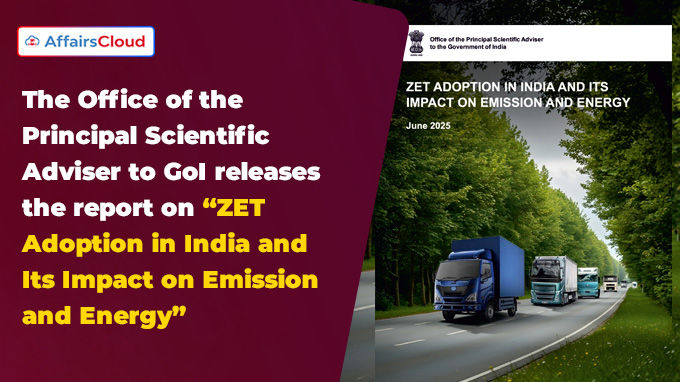 In July 2025, the Office of Principal Scientific Adviser (PSA) to the Government of India (GoI) released the report on the ‘ZET Adoption in India and Its Impact on Emission and Energy (June 2025)’ in New Delhi, Delhi. The report highlights the critical need for supportive policies to fast-track the adoption of Zero-Emission Trucking (ZET) and align with India’s net-zero targets.
In July 2025, the Office of Principal Scientific Adviser (PSA) to the Government of India (GoI) released the report on the ‘ZET Adoption in India and Its Impact on Emission and Energy (June 2025)’ in New Delhi, Delhi. The report highlights the critical need for supportive policies to fast-track the adoption of Zero-Emission Trucking (ZET) and align with India’s net-zero targets.
- The report examines the growth and potential of India’s Medium and Heavy-Duty Truck (M&HDT) sector, projecting a transition to Battery Electric Trucks (BET) that will help in reducing emissions and fuel consumption by mid-century.
- The adoption of ZETs is a significant step in reducing GreenHouse Gas (GHG) emissions, enhancing air quality, and improving energy security.
About the Report:
i.The report is the outcome of a year-long exercise and scenario examination in consultation with leading industries, subject matter experts and various other stakeholders.
ii.The report provides projections on BETs adoption, emission savings in fuel and electricity demand.
iii.The report used historical data from sources such as: Society of Indian Automobile Manufacturers (SIAM), Vahan portal, Ministry of Road, Transport & Highways (MoRTH), Ministry of Petroleum & Natural Gas (MoPNG), and Ministry of Power (MoP) combined with interviews of stakeholders from across the value chain in various regions of the country.
Key Points:
i.India’s freight sector, which is driven mainly by M&HDT, accounts for approximately 70% of the country’s logistics operations and plays an important role in economic growth and industrial development.
- However, this sector is also a major contributor to fuel consumption (approximately 40%) and the country’s emissions.
ii.Given the current scenario in green Hydrogen (H2) production costs and limited infrastructure availability, this report considers that BETs will be the primary ZET for M&HDTs, for some time.
iii.The study indicates that BET adoption is likely to stay minimal during the current decade, with significant growth anticipated only in the longer term.
- However, it will gain momentum in the following decade due to a combination of decreasing costs, improved infrastructure availability and growing acceptance among buyers.
iv.Under a Business-as-Usual (BAU) scenario, BET adoption is projected to be nearly 2% by Financial Year 2034-35 (FY35), approximately 55% by FY45, and reach 100% by FY55.
- However, with proper support measures (the BWS-Business with Support Scenario) BET adoption is expected to increase 18% by FY35 and achieve 100% penetration by FY46.
v.As per the report, electricity consumption by BETs is projected to be a small portion of overall generation capacity, peaking at nearly 8% in FY50.
vi.As a nation committed to achieving Net Zero by 2070, the electrification of freight transport will play a vital role in shaping a cleaner and ore logistics ecosystem.
About Office of Principal Scientific Adviser (PSA):
Principal Scientific Advisor (PSA) – Ajay Kumar Sood
Headquarters- New Delhi, Delhi
Established- 1999




